| Listing 1 - 10 of 36 | << page >> |
Sort by
|
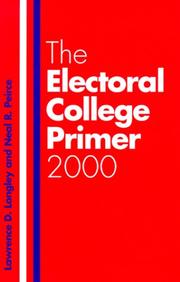
ISBN: 058536074X 9780585360744 0300080352 0300080360 9780300080353 0300080352 9780300080360 0300080360 Year: 1999 Publisher: New Haven : Yale University Press,
Abstract | Keywords | Export | Availability | Bookmark
 Loading...
Loading...Choose an application
- Reference Manager
- EndNote
- RefWorks (Direct export to RefWorks)
Book
ISBN: 0585045186 9780585045184 0791421872 0791421880 9780791421871 9780791421888 1438411138 Year: 1995 Publisher: Albany State University of New York Press
Abstract | Keywords | Export | Availability | Bookmark
 Loading...
Loading...Choose an application
- Reference Manager
- EndNote
- RefWorks (Direct export to RefWorks)
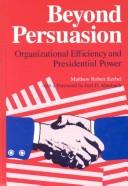
ISBN: 0585064237 9780585064239 0791406938 9780791406939 0791406946 9780791406946 1438408773 Year: 1991 Publisher: Albany, N.Y. : State University of New York Press,
Abstract | Keywords | Export | Availability | Bookmark
 Loading...
Loading...Choose an application
- Reference Manager
- EndNote
- RefWorks (Direct export to RefWorks)
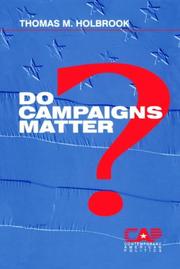
ISBN: 0803973454 1322423318 1452248710 9781452248714 9781452243825 1452243824 0803973446 9780803973442 9780803973459 1506338178 9781506338170 9781322423319 Year: 1996 Publisher: Thousand Oaks : Sage Publications,
Abstract | Keywords | Export | Availability | Bookmark
 Loading...
Loading...Choose an application
- Reference Manager
- EndNote
- RefWorks (Direct export to RefWorks)
Combining actual election results and empirical evidence with data on additional factors such as media coverage, Thomas M. Holbrook develops a model for testing campaigns, and proves how campaigns play a key role in shaping public opinion.
Political campaigns --- Presidents --- Voting --- Election. --- Electioneering. --- Presidents. --- United States. --- Government - U.S. --- Law, Politics & Government --- Political Institutions & Public Administration - U.S., Executive Branch --- Election
Book
ISBN: 1452267421 1604266767 9781604266764 9780872895553 0872895556 9781452267425 9781452240220 1452240221 Year: 2009 Publisher: Washington, D.C. ; London : CQ Press,
Abstract | Keywords | Export | Availability | Bookmark
 Loading...
Loading...Choose an application
- Reference Manager
- EndNote
- RefWorks (Direct export to RefWorks)
Specifically written to engage high school students, this book presents a comprehensive overview of the history and ongoing evolution of the American executive branch. This single-volume resource does not require any prior knowledge of the presidency and covers topics that meet national high school curriculum standards.
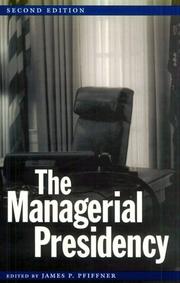
ISBN: 0585369984 9780585369983 0890968586 9780890968581 0890968608 9780890968604 Year: 1999 Volume: no. 4 Publisher: College Station : Texas A&M University Press,
Abstract | Keywords | Export | Availability | Bookmark
 Loading...
Loading...Choose an application
- Reference Manager
- EndNote
- RefWorks (Direct export to RefWorks)
Presidents --- Executive power --- Executive departments --- Bureaucracy --- Government - U.S. --- Law, Politics & Government --- Political Institutions & Public Administration - U.S., Executive Branch --- White House staff --- Staff. --- Staff --- Powers
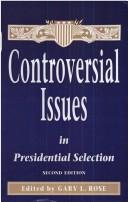
ISBN: 0585033307 9780585033303 0791419355 0791419363 1438417721 Year: 1994 Publisher: Albany : State University of New York Press,
Abstract | Keywords | Export | Availability | Bookmark
 Loading...
Loading...Choose an application
- Reference Manager
- EndNote
- RefWorks (Direct export to RefWorks)
This new edition provides the latest on controversies surrounding the presidential selection process. The text is two-thirds new material, with new articles by John F. Bibby, Robert D. Brown, Emmett H. Buell, Jr., M. Margaret Conway, Thomas E. Cronin, Doris Graber, Jon F. Hale, Everett Ladd, Robert D. Loevy, Theodore Lowi, Wayne Parent, Frank J. Sorauf, and Herbert Weisberg, and revised articles from many of the contributors to the first edition. The book is designed to stimulate lively debate and critical thinking about the modern process of presidential selection. Eleven issues that impact directly on the selection of the president of the United States are examined in a scholarly and argumentative format. Essays pro and con on each issue educate students in the dynamics of presidential selection and help them evaluate competing perspectives on today's pressing issues. The controversial issues examined span the various phases of the selection process, including the nominating system, the nominating convention, and the general election campaign. New issues covered for this edition include whether a third major party in U.S. politics is likely or needed.
Presidents --- Government - U.S. --- Law, Politics & Government --- Political Institutions & Public Administration - U.S., Executive Branch --- Nomination of presidents --- Nominations for office --- Election. --- Nomination. --- Election --- Nomination
Book
ISBN: 128012461X 9786613528476 1593579098 9781593579098 9781593578343 1593578342 Year: 2012 Publisher: Indianapolis, IN JIST Works
Abstract | Keywords | Export | Availability | Bookmark
 Loading...
Loading...Choose an application
- Reference Manager
- EndNote
- RefWorks (Direct export to RefWorks)
This new book is designed to help job seekers find the right federal job. The first part of this unique guide discusses how to find the right occupation through the career-planning process, develop a vision for your career, do self-exploration, develop needed skills, and create career goals. The second part overviews the federal government as an employer, including benefits and locations of jobs, how to match yourself to jobs and agencies, and the skills the government is seeking and in-demand federal jobs. The authors explain the federal job search process, with insider guidance on resumes, i
Book
Year: 2016 Publisher: Institute for Local Self-Government and Public Procurement Maribor
Abstract | Keywords | Export | Availability | Bookmark
 Loading...
Loading...Choose an application
- Reference Manager
- EndNote
- RefWorks (Direct export to RefWorks)
This paper deals with the position and the powers of head of state in the legislative and the executive branch in former socialist systems. It examines the system in countries that emerged from socialist regimes, where the parliamentary system and the function of the President of the Republic as the individual head of state were introduced in the 1990s, namely in 10 (newest) Member States of the European Union. The paper elaborates on the position of the President of the Republic, the extent of the office’s powers, and the resulting cooperation between the office of the President, the executive and legislative bodies, which is also one of the fundamental criteria of the standard classification of political regimes. The powers of the President in the field of legislation are the powers based on which the relationship between the President of the Republic and the legislative authority is established. The analyzed powers that the President exercises vis-à-vis the parliament are the powers of the President in relation to the adoption of an Act, the powers that the President of the Republic has in the domain of announcing parliamentary elections and convening a parliamentary sitting, as well as the powers in the domain of dissolving the parliament and announcing early elections. In the second part the paper focuses on the relationship between the President of the Republic and the government, and, consequently, the President's powers in the formation of the government and the appointing of state officials.
legislative --- head of the state --- systems --- socialist systems --- executive branch --- Czech Republic --- Dissolution of parliament --- Dubrovnik --- Estonia --- Motion of no confidence --- Planned economy --- Prime minister --- Veto
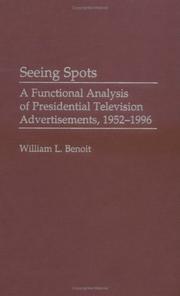
ISBN: 0275966453 0313003254 9780313003257 9780275966454 9798216012450 Year: 1999 Publisher: Westport, Conn. Praeger
Abstract | Keywords | Export | Availability | Bookmark
 Loading...
Loading...Choose an application
- Reference Manager
- EndNote
- RefWorks (Direct export to RefWorks)
A study of presidential television spots from 1952 to 1996. More than 1600 spots are covered, from both primary and general campaigns. It uses the Functional Theory of Political Campaign Discourse, analyzing themes in spots such as acclaims, attacks and defences.
Advertising. Public relations --- Mass communications --- United States --- Presidents - United States - Election. --- Political Institutions & Public Administration - U.S., Executive Branch --- Government - U.S. --- Law, Politics & Government --- Advertising, Political --- Presidents --- Television in politics --- Election. --- Election --- United States of America
| Listing 1 - 10 of 36 | << page >> |
Sort by
|

 Search
Search Feedback
Feedback About UniCat
About UniCat  Help
Help News
News